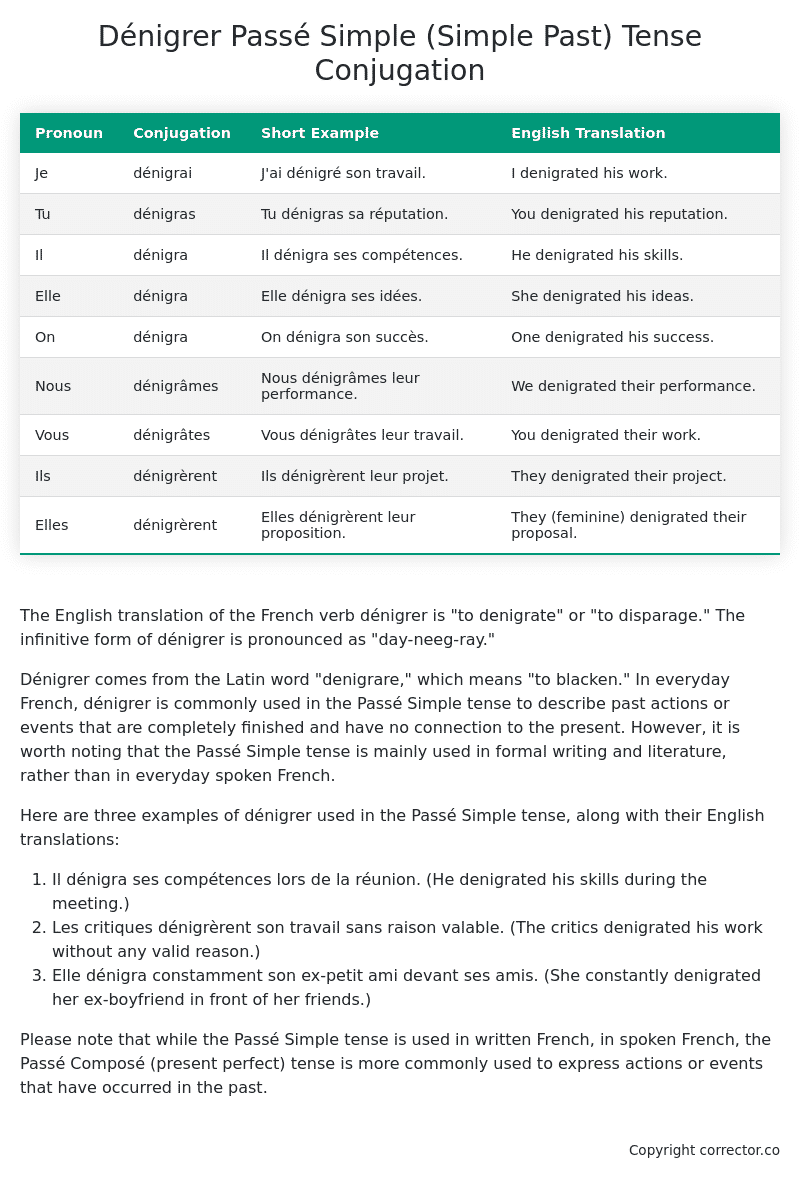Passé Simple (Simple Past) Tense Conjugation of the French Verb dénigrer
Introduction to the verb dénigrer
The English translation of the French verb dénigrer is “to denigrate” or “to disparage.” The infinitive form of dénigrer is pronounced as “day-neeg-ray.”
Dénigrer comes from the Latin word “denigrare,” which means “to blacken.” In everyday French, dénigrer is commonly used in the Passé Simple tense to describe past actions or events that are completely finished and have no connection to the present. However, it is worth noting that the Passé Simple tense is mainly used in formal writing and literature, rather than in everyday spoken French.
Here are three examples of dénigrer used in the Passé Simple tense, along with their English translations:
- Il dénigra ses compétences lors de la réunion. (He denigrated his skills during the meeting.)
- Les critiques dénigrèrent son travail sans raison valable. (The critics denigrated his work without any valid reason.)
- Elle dénigra constamment son ex-petit ami devant ses amis. (She constantly denigrated her ex-boyfriend in front of her friends.)
Please note that while the Passé Simple tense is used in written French, in spoken French, the Passé Composé (present perfect) tense is more commonly used to express actions or events that have occurred in the past.
Table of the Passé Simple (Simple Past) Tense Conjugation of dénigrer
| Pronoun | Conjugation | Short Example | English Translation |
|---|---|---|---|
| Je | dénigrai | J’ai dénigré son travail. | I denigrated his work. |
| Tu | dénigras | Tu dénigras sa réputation. | You denigrated his reputation. |
| Il | dénigra | Il dénigra ses compétences. | He denigrated his skills. |
| Elle | dénigra | Elle dénigra ses idées. | She denigrated his ideas. |
| On | dénigra | On dénigra son succès. | One denigrated his success. |
| Nous | dénigrâmes | Nous dénigrâmes leur performance. | We denigrated their performance. |
| Vous | dénigrâtes | Vous dénigrâtes leur travail. | You denigrated their work. |
| Ils | dénigrèrent | Ils dénigrèrent leur projet. | They denigrated their project. |
| Elles | dénigrèrent | Elles dénigrèrent leur proposition. | They (feminine) denigrated their proposal. |
Other Conjugations for Dénigrer.
Le Present (Present Tense) Conjugation of the French Verb dénigrer
Imparfait (Imperfect) Tense Conjugation of the French Verb dénigrer
Passé Simple (Simple Past) Tense Conjugation of the French Verb dénigrer (You’re reading it right now!)
Passé Composé (Present Perfect) Tense Conjugation of the French Verb dénigrer
Futur Simple (Simple Future) Tense Conjugation of the French Verb dénigrer
Futur Proche (Near Future) Tense Conjugation of the French Verb dénigrer
Plus-que-parfait (Pluperfect) Tense Conjugation of the French Verb dénigrer
Passé Antérieur (Past Anterior) Tense Conjugation of the French Verb dénigrer
Futur Antérieur (Future Anterior) Tense Conjugation of the French Verb dénigrer
Subjonctif Présent (Subjunctive Present) Tense Conjugation of the French Verb dénigrer
Subjonctif Passé (Subjunctive Past) Tense Conjugation of the French Verb dénigrer
Subjonctif Imparfait (Subjunctive Imperfect) Tense Conjugation of the French Verb dénigrer
Subjonctif Plus-que-parfait (Subjunctive Pluperfect) Tense Conjugation of the French Verb dénigrer
Conditionnel Présent (Conditional Present) Tense Conjugation of the French Verb dénigrer
Conditionnel Passé (Conditional Past) Tense Conjugation of the French Verb dénigrer
Conditionnel Passé II (Conditional Past II) Tense Conjugation of the French Verb dénigrer
L’impératif Présent (Imperative Present) Tense Conjugation of the French Verb dénigrer
L’impératif Passé (Imperative Past) Tense Conjugation of the French Verb dénigrer
L’infinitif Présent (Infinitive Present) Tense Conjugation of the French Verb dénigrer
L’infinitif Passé (Infinitive Past) Tense Conjugation of the French Verb dénigrer
Le Participe Présent (Present Participle) Tense Conjugation of the French Verb dénigrer
Le Participe Passé (Past Participle) Tense Conjugation of the French Verb dénigrer
Struggling with French verbs or the language in general? Why not use our free French Grammar Checker – no registration required!
Get a FREE Download Study Sheet of this Conjugation 🔥
Simply right click the image below, click “save image” and get your free reference for the dénigrer Passé Simple tense conjugation!

Dénigrer – About the French Passé Simple (Simple Past) Tense
Formation
Usage
Narration
Historical Context
Interactions with other tenses
Passé Composé
Imparfait
Conditional and Subjunctive
Summary
I hope you enjoyed this article on the verb dénigrer. Still in a learning mood? Check out another TOTALLY random French verb conjugation!


